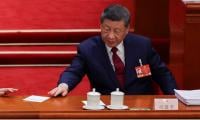Delayed reforms
It was the government that formed the Fata reforms committee and touted its proposed merger with Khyber Pakhtunkhwa and now it is the government which seems to be backing away from it. The last meeting of the federal cabinet had approval of the reforms package on its agenda but it was suddenly dropped without explanation. This led to a protest in the National Assembly from Fata MNAs from all parties, with Shahabuddin Khan of the PML-N tying a black gag around his mouth. This is a powerful symbol of the way the people of Fata have been treated not just through this process but throughout Pakistan’s history. The only people who were not represented in the reforms committee were the residents of Fata itself and it is they who should be allowed to decide on their future. Even though the reforms package was not devised by the people of Fata, it did at least propose merging the tribal areas with Khyber Pakhtunkhwa, bringing them under the protection of the constitution and gradually repealing the Frontier Crimes Regulation. The original plan called for the process to be carried out over a period of 10 years but opposition parties wanted it implemented before the 2018 elections. Now, with the cabinet slow-walking approval, its future is left in doubt.
Part of the reason the government now seems hesitant to implement its own ideas is that it has met more opposition than expected, with the government’s own allies turning against it. Both the Pakhtunkhwa Milli Awami Party and the JUI-F have come out against the proposals, likely because they feel their power in KP might decline if Fata has its own influential political forces. But the representatives of Fata itself are determined that the merger go through. Fata parliamentarians held a convention in Islamabad earlier this week demanding both the merger of Fat and KP and the repeal of the FCR. Equally importantly, the convention called for compensation to be paid to those who have been affected by military operations in the area and for Fata to be made part of the National Finance Commission Award. Certainly, any merger will come with a new set of problems since Fata is less developed and will need special attention to be brought to par with the rest of the country. But the reason this disparity exists is because Fata has been ignored and treated as separate from the rest of the country since Independence. The government has promised Fata’s people that it would rectify that and failing to follow through would be a grave betrayal.
-
 Nicole Kidman's Daughter Sunday Rose Under Intense Backlash Post-Keith Urban Divorce
Nicole Kidman's Daughter Sunday Rose Under Intense Backlash Post-Keith Urban Divorce -
 Teddi Mellencamp Reveals Medication Side-effects Landed Her In The Hospital
Teddi Mellencamp Reveals Medication Side-effects Landed Her In The Hospital -
 Chase Stokes Calls Out Morgan Evans Over Comments On Kelsea Ballerini Split
Chase Stokes Calls Out Morgan Evans Over Comments On Kelsea Ballerini Split -
 Elon Musk Says Legal Pressure Forced Him To Pay Full Price For Twitter
Elon Musk Says Legal Pressure Forced Him To Pay Full Price For Twitter -
 Sarah Ferguson’s Downfall & Housing Crisis: Pals Make A Decision On Radioactive Ex-Duchess
Sarah Ferguson’s Downfall & Housing Crisis: Pals Make A Decision On Radioactive Ex-Duchess -
 Taylor Swift Faces Awkward Situation Ahead Of Her Wedding To Travis Kelce
Taylor Swift Faces Awkward Situation Ahead Of Her Wedding To Travis Kelce -
 Anthropic, Pentagon Resume Talks On ‘high Stakes’ AI Defense Deal
Anthropic, Pentagon Resume Talks On ‘high Stakes’ AI Defense Deal -
 OpenAI Annualized Revenue Hits $25 Billion Milestone Amid Global Adoption Surge
OpenAI Annualized Revenue Hits $25 Billion Milestone Amid Global Adoption Surge -
 Princesses Beatrice, Eugenie’s Parents Hurt Their Future With William, Kate: ‘The Knives Are Out’
Princesses Beatrice, Eugenie’s Parents Hurt Their Future With William, Kate: ‘The Knives Are Out’ -
 Billy Porter Claims He Came Back From The Dead Amid Sepsis Battle
Billy Porter Claims He Came Back From The Dead Amid Sepsis Battle -
 Jason Dickinson Reportedly Headed To Oilers In Trade With Chicago Blackhawks
Jason Dickinson Reportedly Headed To Oilers In Trade With Chicago Blackhawks -
 Harry Styles Hints He's Ready For Marriage And Family Life
Harry Styles Hints He's Ready For Marriage And Family Life -
 David Harbour’s Ex Faced Extreme Humiliation At Lily Allen’s Producer's Birthday Bash
David Harbour’s Ex Faced Extreme Humiliation At Lily Allen’s Producer's Birthday Bash -
 China Targets Tech Innovations Amid High Stakes Rivalry With US: Key Strategies Explained
China Targets Tech Innovations Amid High Stakes Rivalry With US: Key Strategies Explained -
 Pacers Vs Clippers: Kawhi Leonard Powers Clippers Past Pacers For Third Straight Win
Pacers Vs Clippers: Kawhi Leonard Powers Clippers Past Pacers For Third Straight Win -
 Scientists Build Tiny AI Brain Model Using Monkey Neurone Data
Scientists Build Tiny AI Brain Model Using Monkey Neurone Data



